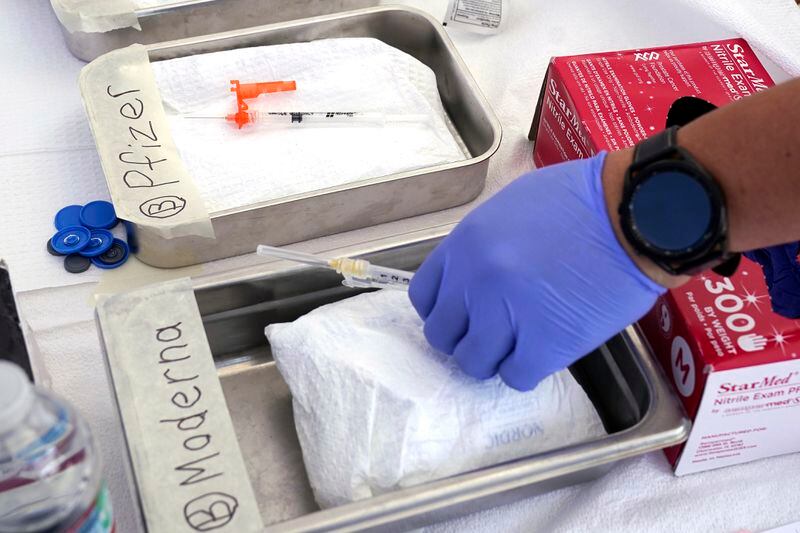And even as cases rise and it may seem — once again — like everyone knows someone who is sick with COVID right now, attitudes toward the virus have changed, and many doctors and health experts are reevaluating the role of COVID vaccines at this point in the pandemic.
Olson says it has become less important to get additional COVID vaccines, especially for people who aren’t at risk of severe illness. A growing number of doctors agree.
As the world waits for new vaccines to arrive, what has become a seasonal summer outbreak continues. The Centers for Disease Control and Prevention no longer tracks case counts but estimates the trend in the virus’s spread based on emergency room visits. According to the CDC, in the week ending July 20, Georgia reported that about 1.5% of emergency room visits were diagnosed as COVID, a slight increase from the previous week. Nationally, 1.9% of all emergency room visits were due to COVID, also up slightly from the previous week.
The FDA has announced that a new COVID-19 vaccine is expected in August or September that will better target the newer variants of the virus. And while the Centers for Disease Control and Prevention generally recommends that everyone six months and older get the COVID vaccine, some in the medical industry are taking a less comprehensive approach.
“I was very supportive of vaccination at first because back then we were dealing with severe disease and people could become seriously ill or die or need long-term care or, you know, have a major risk or complication,” Olson said. “Now we’re dealing with a much milder disease. And that’s the challenge with viruses: Viruses tend to mutate and therefore evade vaccines.”
He acknowledges that his view may be controversial, but said: “I think you’ll find that among physicians, a lot of us probably aren’t getting the boosters because we feel like it’s lagging behind the actual variants that we’re seeing. If they came out with a vaccine that said, ‘Hey, this is going to be the cure, you’re not going to get COVID anymore,’ I would accept that, but that’s not guaranteed by the current vaccines that we have.”
Officials have acknowledged that the need for boosters is not as urgent as it was a few years ago. For the average person, vaccines now provide a gradual buildup of immunity, and their effectiveness can wane after just a few months. But the FDA, CDC and most doctors agree that getting the vaccine remains especially important for older adults and those with preexisting health conditions. Olson agreed that people at highest risk of serious illness or death should still get vaccinated.
Credits: AP
Credits: AP
As the virus continues to evolve, it is questionable whether it is practical for healthy young people to get vaccinated against specific variants, especially when vaccine developers are failing to keep up with the pace of coronavirus mutations.
In June, the Food and Drug Administration decided to ask manufacturers to tweak the strain of the virus targeted by fall vaccines. The CDC says the variant has changed again since that decision was made, but the formula should still be effective. Health officials say that even when vaccines aren’t a perfect fit, they can still provide protection against severe disease.
While Dr. Andrew Reisman, a Gainesville physician, continues to encourage his patients in high-risk groups to get vaccinated, he is less adamant now, in part because treatments are available and the illnesses tend to be less severe. As for healthy young adults, he is neutral.
“I tell them, ‘Are you worried about COVID? Do you want to get vaccinated? Then get vaccinated. If you’re not worried and don’t want to get vaccinated, don’t get vaccinated,’” said Reisman, a former president of the Georgia Medical Association.
But that’s only part of the conversation. For those who want to avoid the COVID vaccine and downplay the virus, he urges them to be alert to any cold symptoms and not assume it’s just a cold. He’d like them to take steps to protect the vulnerable people around them by staying home.
“As someone who is responsible for protecting the health of people and my patients, I find it very frustrating that some people don’t think about others and think that COVID is not serious, but it’s much more contagious than other viruses,” Reisman said. “You could end up killing someone who doesn’t have as strong an immune system as you do.”
Credit: Miguel Martinez
Credit: Miguel Martinez
Dr. Jayne Morgan, executive director of community health and education at Piedmont Healthcare, acknowledged the limitations of current COVID vaccines and said they may not be necessary for everyone at this point in the pandemic. But those answers are far from simple and one-size-fits-all.
“Unless variants evolve into more severe symptoms, older people, those with multiple chronic conditions, or those who are immunocompromised should be prioritized,” she said. “There is certainly an argument for not vaccinating younger and healthier people unless variants begin to pose a greater health threat and/or next-generation vaccines become available with greater durability and broader coverage,” she said.
But when Healthy young people can spread the virus even if they don’t get sick, which is why the case for vaccination can be made, Morgan said.
“There’s certainly another argument to be made for protecting the elderly and the immunocompromised as a priority as we continue to live in this era of first-generation vaccines, while we wait for next-generation vaccines,” she said. “That doesn’t mean people can’t have normal lives, but rather that vaccines are beneficial to everyone, young and old. … What one does, impacts the other.”
